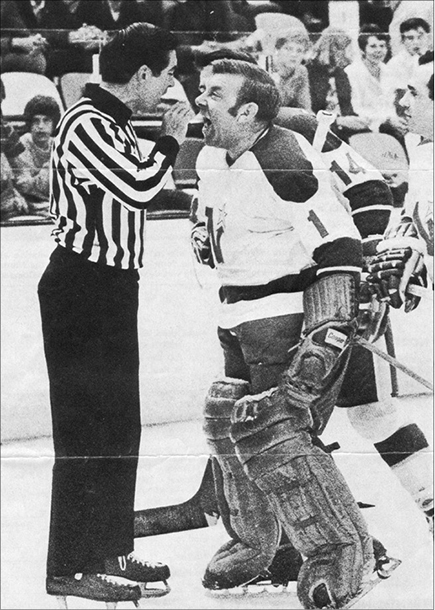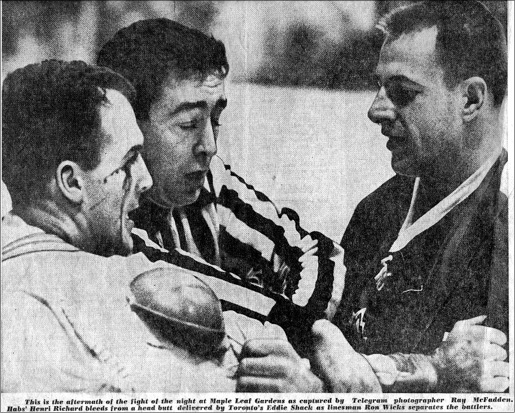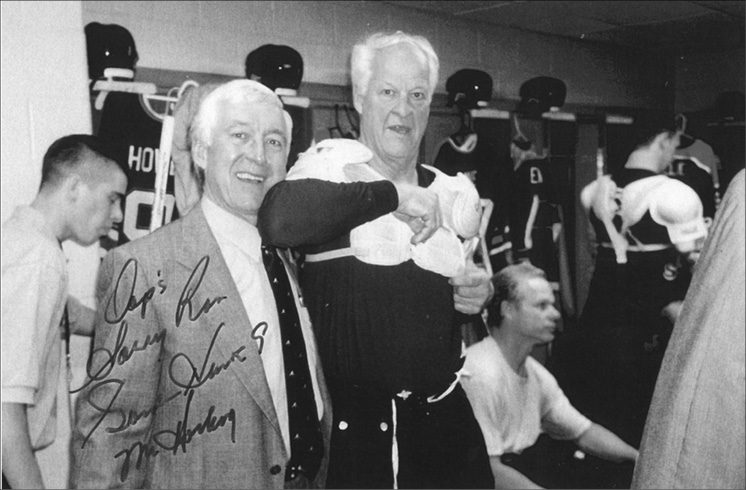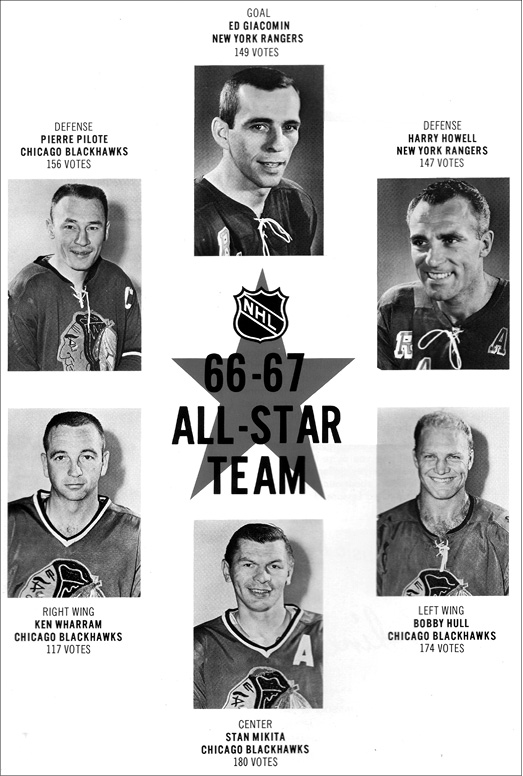

These are my picks for top goalies:
Fortunately, every decade had its star goalies. My choice of more modern-day goalies would include Patrick Roy and Martin Brodeur — and recently, many European clubs are putting out some top-ranked goalies.

“Gump” Worsley and Ron having a chat.
Minnesota North Stars
The same concept of filling the gap seems to take place with the forwards and defencemen. When Rocket Richard left, Gordie Howe took over, then Bobby Hull, Bobby Orr, Wayne Gretzky, Mario Lemieux, and so on. Superstars seemed to come along just as the older guys were fading away, which is one reason the game is so great!
Presently, a substantial number of hockey’s most skilled players come from Europe, where they focus on skating, passing, and shooting (and not just “finish the check” or run somebody over!).
When I started in the League in 1960, I recall there was one U.S. player in the League, Tommy Williams. The remaining players were pretty well all Canadian. Today, the NHL is comprised of about 50 percent Canadian players, 20 percent American, and the remaining 30 percent from Europe and Russia. It has become truly an international game with high skill levels.
Eddie “the Entertainer” Shack who, again, was from Sudbury, was an interesting fellow and as tough as nails. Gordie Howe told me a few years ago that when he and Eddie collided, his teeth hurt, so they agreed to stay away from each other. I mentioned this story to Eddie and he agreed that he didn’t go out of his way to get Gordie upset. There was mutual respect on both sides.

Ron with Henri Richard, who was being “coco bonked” by Eddie Shack, ca. 1963.
No extra penalty was imposed.
Ray McFadden, Toronto Telegram
A lot of people thought Eddie was the clown prince of hockey, but he was also a pretty good player.14 I worked the all-star game in Toronto in 1962, where Eddie was voted the Player of the Game. (He got a goal and two penalties.) He scored the winning goal when Toronto beat Detroit to win the Stanley Cup in the spring of 1963. I worked the lines in that game and it was a thrill to be part of the spectacle. Ed and I ended up refereeing Oldtimers games together, and we were also business partners in a golf course in Oakville, Ontario. We played quite a lot of golf together and he was never dull.
One time, while playing golf at the Idylwylde Golf Club in Sudbury, Ed hit one towards the out-of-bounds area, and asked the pro who was playing with us if he should hit another ball. When the pro said “Yes,” Ed informed us all that he was going to hit a “provincial.” My dad was sitting in the golf cart enjoying a beer and he said, “Is that what they call it?” I replied, “It is now!” We all smiled as Ed hit his extra shot, and we realized he had put another term into the golf books. There was a “local rules” sheet posted on the bulletin board of the clubhouse that read, “All provisionals must be hit from the tee blocks.” The pro changed it to “provincials.”

Gordie Howe “Mr. Hockey” with Ron. 1999 “Legends” all-star Game, Tampa, Florida.
Author’s Collection with thanks to Gordie Howe
Gordie was my idol and still is, at over eighty years of age. He led the Red Wings to Stanley Cups in 1950, 1952, 1953, and 1955. He also scored the Cup-winning goal in 1955. He was big, strong, smart, and tough, and played 1,767 games during twenty-six years in the NHL. He was selected to play twenty-one post-season all-star games and played an additional five years in the WHA. He also played alongside his sons Marty and Mark, and lasted until he was over fifty years old. He could do it all!
And to think that Gordie’s career almost ended in his third year in the League, during the 1950 Stanley cup playoffs, when he suffered a serious head injury and spent two weeks in hospital. Howe returned the next season and won the first of his six scoring titles.
Stan Mikita, who was born in Czechoslovakia, was adopted by his new Canadian parents when he was eight years old and moved to Canada. He had a hard upbringing and fought for everything he got in life. Early in my linesman’s career, I recall waiving off a play in front of the Black Hawks bench, and felt my whistle hand hit something hard. It was Stan’s head. My sharp whistle cut him and he had to get several stitches over the eye. I can still see the trainer holding a towel to Stan’s bleeding eye, with both of them screaming at me. I spent the rest of the evening on the other side of the ice! Several years ago, Stan had some health problems, and I sent him a get-well card telling him to keep his head up.
Stan was a great competitor — not a big guy, but tough as nails. He led the League in penalties and then, suddenly, he reformed. Apparently, his daughter asked him why he was always sitting by himself during games in the penalty box, and the lights went on! He turned out to be one of the best players in the game.
Stan would get into some nasty altercations with top players. He and Henri Richard would go after each other with a vengeance. Eddie Shack was also on his dance card.
For two years running, he won all three major League Awards: the Scoring Championship, the Most Valuable Player award, and, unbelievably, the Most Gentlemanly Player. After one of these seasons was over, Barb and I were holidaying in Florida with our old goalie pal Ed Giacomin and his wife, and Stan was also staying at our hotel. The League wanted him to interrupt his vacation with his family and fly up to Montreal for the awards ceremony. But he said “Nope,” and he never went.

1966 NHL all-stars. Stan Mikita was the only unanimous all-star selection.
National Hockey League
St. Louis Blues forward Bernie Federko had a lovely little habit before the game. He would look over to see who the referee was, then slowly shake his head in dismay. This would not go unnoticed by us referees (and I have had this fact verified by my colleagues). One night in St. Louis, he was tripped up by an opponent, and I started to raise my arm to impose a penalty, when suddenly my arm “involuntarily” came back down! I guess my mind and body just would not let my arm stay up. I recall his captain coming over and saying, “Just because Bernie is acting like a jerk, doesn’t mean you shouldn’t call the penalty on the other player.” I admitted my guilt to his captain, who just nodded his head and skated away quietly
I mentioned this little incident to Bernie when I refereed the Hall of Fame game after his induction, several years ago. We both chuckled, while jointly agreeing we were probably both out of order.
I recall a situation in the International League in Des Moines, Iowa. The home team had a tough guy named Ivan “The Terrible” Prediger. I gave him three minor penalties on one play. He said it was impossible. I said, “Watch me!” After he retired as a player, he came up the referee school we ran in Canada and took up officiating — so we converted one of them!
Leo played for the Boston Bruins in the late 1950s. He had a habit of irritating the star players on opposing teams, causing them to forget about scoring goals and, instead, run around the ice trying to catch him.
Montreal star Maurice “The Rocket” Richard was a favourite target, and there was no love lost between them. Some grudges were never resolved. About fifteen years ago, “The Rocket” was refereeing an NHL Old-timers game in North Bay, when Leo walked into the dressing room and said, “Hi, Rocket, how are you?” Maurice didn’t look up. “F . . . k off,” he mumbled, and Leo kept right on going. One of the players, Gilles Marotte, mentioned to me that he damn near fell over laughing at this incident.
Dennis Savard, the shifty Black Hawks forward, was one of my ten-year-old son, Brian’s, favourite players. One night, I asked Dennis if he could spare one of his aluminum hockey sticks for my son; he said “Sure.” Later in the game, things went a little squirrelly and I had to eject a couple of players with about two minutes left in the game. Dennis approached me in the corner of the rink, casually handed me the stick, and voluntarily skated off the ice to his dressing room.15 Here I was, standing there holding his stick, with 20,000 irate Chicago fans telling me where to put it! My linesmen laughed like hell. Thanks, Dennis. I learned that you have to watch what you ask for.
During a game in Pittsburgh, the Penguins goalie, Gilles Meloche, came over and mentioned to me that Toronto’s “Tiger” Williams would spear him in the goalie pad, just as the shot was coming in from the blue line. So I said I would watch for any indiscretions, and sure enough, on the next shot, just as his defenceman was shooting the puck, Tiger speared the goalie as the puck went into the net. I skated to the scorer table to disallow the goal and impose the penalty on Tiger for goalie interference. Tiger was, of course, following me and appealing my rulings. Suddenly, I heard a big schmozzle behind me, and my linesman Leon Stickle was busy restraining Tiger and Gilles. Leon then informed me that while Tiger was chasing me, Gilles had come out of his net and punched Tiger in the back of the head. Tiger had then swung his stick and struck Gilles in the upper body area. Tiger was summoned to a disciplinary hearing to review his little “stick swinging” incident.
We convened a hearing in Toronto with Brian O’Neil, the League disciplinarian. We all told our version of the events, and Tiger got up to say his piece. I was flabbergasted when Mr. O’Neil asked Tiger if it might have possibly been a reflex action from getting punched that caused him to swing his stick. Tiger said, “No way.” He stated that the goalies were dressed like gladiators and that they were not allowed to run around hitting high-priced talent like him! I recall that his GM at the time, Jim Gregory, told him that if he did not keep quiet he might get life. Recently I read where Tiger had said I was his favourite referee. Tiger, you were one of my favourite players!
Noel Picard was a former St. Louis Blues player turned radio-broadcast colour man. He was a wonderful French-Canadian who mangled the English language. He used to call the St. Louis owner, Sid Salomon III, “Sid de turd,” which I’m sure endeared him to the owner!
Noel was playing in Omaha one night in the old Central Pro League, when Gus Kyle, coach of Kansas City, called him a “gutless frog.” All I remember is Noel going over the boards. With the sparks flying off his skate blades, he chased Gus on the cement around the perimeter of the arena. Ironically, years later they both worked together on the Blues broadcasts and became great pals. The charming term “frog” was used generally without malice and usually got people’s attention.
The movie Slap Shot, filmed back in the 1970s and featuring Paul Newman, spoofed hockey. It also starred the three “Hanson Brothers,” who are Americans Steve Carlson, Jeff Carlson, and Dave Hanson. They are great entertainers and super guys. They play exhibition games around North America and Europe and they put on a good show. They brought along their French-Canadian goalie from the original movie, Yvon Barette, who played Denis Lemieux in the movie. Yvon lives in the Gaspé area of Quebec. This benefit game I refer to was played a few years ago in Uxbridge, Ontario, to a full house, and Wayne Gretzky’s father, Walter, was their coach. Walter, as a joke, was critiquing my refereeing and he got a little excited when I told him and the crowd — I had a microphone — that his son Wayne was a pretty fair player, but that Bobby Orr was probably better.

Walter Gretzky (on right) with the Hanson brothers, ca. 2005.
Author’s Collection
The Los Angeles Kings of the 1970s had a free-spirited goalie, Gary Simmons, who played maybe about twenty games as Roggie Vachon’s backup. One night, while entering the “Fabulous Forum” owned by Jack Ken Cooke — the “shy, withdrawn” megalomaniac owner of both the Kings and the NBA Lakers — I observed that Gary had parked his motorcycle in Mr. Cooke’s personal parking spot, right inside the building near the team’s dressing room. I chatted with the parking attendant, who, while chuckling, informed me that Mrs. Cooke had told him it was okay for Gary to park in the “sacred spot.” Mr. Cooke, surprisingly, did not seem to raise a fuss over it. Apparently, Gary used to go out into the desert and buy turquoise jade jewelry from the Native American Indians and he would give it to Mrs. Cooke, hence the special parking privileges. Gary knew how to get to the boss’s heart — through his wife!
Emblazoned on the side of Gary’s motorcycle was a picture of a hawk circling a small field mouse lying on its back with its middle finger extended upwards at the hawk. The caption under the picture read, “The last defiant stand!” I liked that line. Gary was not too concerned about slapshots or owners — the true definition of a backup goalie.
Gary Smith was a large, six-foot-five goalie who played for the expansion Oakland Seals. We were in Boston when he figured he was interfered with at the time a goal was being scored on him. As mentioned previously, goalies were a bit sensitive about being bumped, so he chased after me and was trying to get my attention. Unfortunately, being a big guy and loaded with equipment, he could not stop in a hurry. While cruising into me, he struck me with his elbow, and I kind of flew through the air and was held up by one of his teammates. Otherwise, my 160-pound frame might still be hanging in the old Boston Gardens. I had no alternative but to eject him from the game, although I really felt he had no intention of physically abusing me!
We convened a hearing, and I recall his GM at the time, Bill Torrey (who went on to fame with the New York Islanders), trying to convince Clarence Campbell, the trial judge, that the goalie skates worn by Mr. Smith precluded him from stopping in short order, and that was why he (Mr. Smith) had run into me. Mr. Campbell thanked Mr. Torrey for his dissertation on goalie skates and suspended Mr. Smith for three games.
An ugly confrontation at Madison Square Gardens in New York on December 23,1979, illustrates the type of incidents that took place “in the Good Old Days.” The aftermath demonstrates how the League owners typically reacted.
At the end of a bitterly fought game between the Rangers and the Boston Bruins, a Ranger fan grabbed Bruins player Stan Jonathan’s stick. Of course eighteen Bruin players, led by Terry O’Reilly, went into the stands after the fan. O’Reilly was followed by Peter McNab and, ultimately, by Mike Milbury of the Bruins, who allegedly took one of the fan’s shoes off and hit him with it. Milbury then threw the shoe onto the ice surface.
A month later, NHL president John Ziegler suspended O’Reilly for eight games and McNab and Milbury for six games. They were each fined $500, and the rest of the Bruins, except for their goalkeeper Gerry Cheevers who had reached the locker room and was reportedly “already on his second beer,” were fined up to $500.
An outraged Bruins organization tried unsuccessfully to overturn the suspensions in court. Paul Mooney, the team president, said in a statement, “We do not accept his [John Ziegler’s] findings, and we are very proud of our players and the way they conducted themselves under very difficult circumstances.”
To compound matters, Rangers president William M. Jennings said the “referee caused the whole problem.”
One night in Quebec City, a fan near the Quebec bench was using some rather uncomplimentary words about me, and I casually asked the charming young lady sitting next to him in my best French accent why she was sitting next to a jerk like him. The fans around the bench cheered for the referee after that!
Games between the Canadiens and the Quebec Nordiques, especially in Quebec City, were unbelievable. The atmosphere was at a fever pitch; most of the fans there were private season’s ticket holders. There were not too many corporate boxes. Loyal fans drove several hours from Northern Quebec and they were passionate. They would holler at the referees, and if the Nordiques were having a bad night, they would get the brunt of it.
One game in Quebec between the Nordiques and a touring Russian team was a beauty. The Nordiques’ goalie, Dan Bouchard, let a few soft ones go in between his legs and the local team lost. He tried to pin the loss on me, and I told him that if he had kept his legs closed none of us would be in this mess. I had brought my wife and children in from Brampton for the game, and my wife had to muzzle our ten-year-old son, Brian, as he kept telling the fans that his dad was the referee. She figured we might all get shot!
On occasion, I took Barb on road trips, and she remembers well one trip to Cleveland. The rink usher found her a good seat, and then, when my calls went against the home team, he informed the crowd that Barb was the referee’s wife, and they hurled insults and popcorn at her!